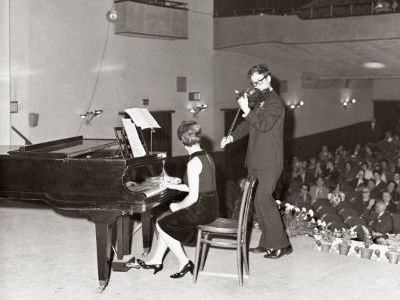The national violin prize “Città di Vittorio Veneto” was born in 1962 thanks to the initiative of some music lovers of the city: Professor Antonia Pallavicini (chairperson of the Association “Amici delle Musica” of Vittorio Veneto), Sir Vittorio Costantini and Sir Arturo Pasqualis (President of the Azienda Autonoma di Soggiorno e Turismo – the institution in charge of tourism – the first to organize the event).
Mario Benvenuti (1915-1995) was the creator and supervisor of the competition. He was a violinist and viola player from Conegliano, a highly qualified concert performer and teacher, member of the “Quintetto Chigiano”, of the “Sestetto Chigiano” and of the “Virtuosi di Roma”.
The first edition of the competition took place in September 1962, with the contribution of the city council of Treviso and the Tourism Institution of the Province. It was an yearly event until 1972 and after that it became a biannual one.
After the first editions, music teacher Mr. Benvenuti had the brilliant intuition of adding to the competition an event dedicated to young and very young musicians. That is how, in 1964, the festival for young violin students and then, in 1977 the one dedicated to viola players, in 1979 to cello players and in 2004 to string bass players, started. Moreover, there are also the festivals for string trios, quartets and quintets, together with the exceptional competitions for duos, which took place during some of the editions.
From the organizational and artistic points of view, the long and qualified contribution given by Fiorella Foti was very important. She was the general secretary and art supervisor from 1971 and, later, also the art director of the competition, until 2005. Also Tiziano Forcolin, who worked side by side with Fiorella Foti from 1969 to 1990 as an organizing manager, gave a valuable contribution to the whole project.
The art supervision in 2007, 2012, 2014 and 2020 was assigned to the composer Stefano Da Ros, from Vittorio Veneto, and in 2010 to Roberto Zarpellon.
The art director of the last two events, in 2012 and 2014, was Massimo Quarta, an internationally renowned violinist who won the competition of Vittorio Veneto in 1986.
Many generations of violin players have come to the competition of Vittorio Veneto for more than 50 years and during this time, the competition has been the main reference point for the Italian schools of string instruments. To the winners (whose names are listed in the hall of fame), the first prize was the starting point of a brilliant career in concert halls and in teaching.
To every event, the best Italian violinists, composers, conductors and musicologists have been invited to be part of the jury. Very important people have been leading the juries, such as Marcello Abbado, Luciano Chailly, Giorgio Ferrari, Ettore Gracis, Virgilio Mortari, Goffredo Petrassi, Leonardo Pinzauti, Massimo Quarta, Uto Ughi.
Until 2010, the art direction was assigned to a committee with different people in it, who followed one another, among whom internationally renowned musicians such as Salvatore Accardo, Mario Brunello, Giuliano Carmignola; Piero Farulli, Rocco FIlippini, Bruno Giuranna, Claudio Scimone, Renato Zanettovich, Piero Toso.
Since 1970, many prestigious orchestras have played at the gala concert of the best ranking musicians and at the final test of the competition: Orchestra Haydn of Trento and Bolzano, the orchestra of the Mozarteum of Salzburg, the orchestra of Teatro La Fenice of Venice, the orchestra Filarmonia Veneta of Treviso, the orchestra of Padua and of the Veneto region.
Between 1999 and 2010, both the competition and the festivals were part of the E.M.C.Y. (European Union of Music Competition for Youth), an organization that links the main European competitions for young musicians. After six years of interruption, the city of Vittorio Veneto has decided to start the competition again and launch it on an international level, by opening it to the young talented citizens of the European Union and assigning its art direction to Francesco De Angelis, a prominent violinist (winner in 1993 of the Prize “Città di Vittorio Veneto”) who, after having won an international competition in 1998, was chosen by Riccardo Muti to have a supportive role both in the orchestra of Teatro alla Scala, and in the orchestra Filarmonica della Scala (positions that he still has today). He is a teacher at the Music Conservatory of Losanne in Sion (Switzerland).
For the first European Edition, which takes place with the recognition of the Fondazione Teatro alla Scala of Milan, the three musicians who will be admitted to the final test, will be accompanied by the Orchestra of the Accademia Teatro La Scala of Milan.

